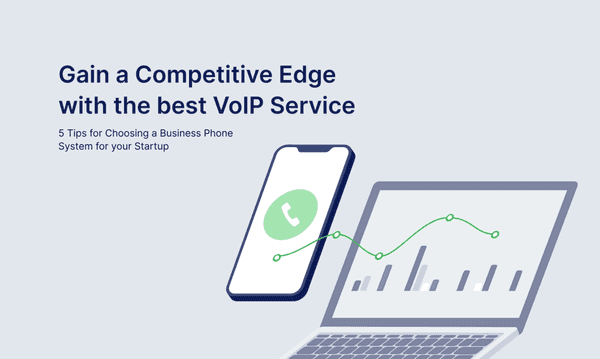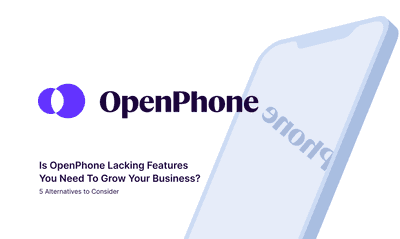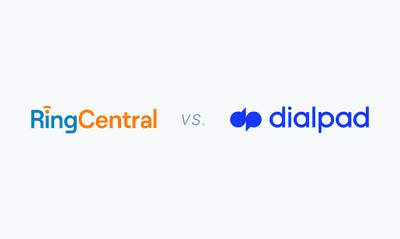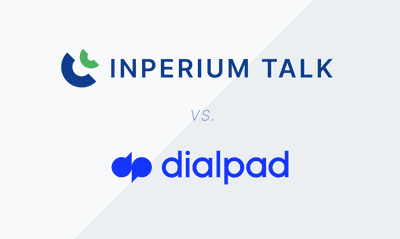Gain a Competitive Edge with the Best VoIP Service: 5 Tips for Choosing Business Phone System for Startup
As startups by nature typically start small, employees will often need to take on multiple roles within the team, as they also tend to move fast, you need a business phone system that can keep up. In this blog post, we will share some of the most important tips to choose a VoIP provider for your business.
7 min read

Elizaveta Komarova
Oct 08, 2021

VoIP solution will help your business
Launching a startup means facing a vast number of tasks, challenges, and difficulties from right at the beginning. Budgets are often limited, rapid expansion is both wanted and feared, and it all depends on the ability to adapt to constantly changing needs and circumstances. Cloud-based VoIP solutions can be an efficient tool to help your startup to achieve significant outcomes. Due to the ultimate combination of low entry costs and easy scalability, VoIP systems can dramatically reduce launch risks. Let’s have a quick look at those VoIP advantages that are of great importance for small businesses.
Cloud-based VoIP Advantages for Startups:
Flexibility
With VoIP phones, you are given the freedom to work from anywhere, whether it be from home, a shared working space, a car, or a café, etc. The flexibility to work from anywhere is a huge advantage for startups that begin to work before finding a final office space and need a reliable communication tool. The added benefit of VoIP tools is that they can easily be moved from place to place as the business begins to expand.
Scalability
While you may only need a few phone lines first, as your company grows and begins to scale, so will your need for additional phone lines. VoIP systems provide quick and easy scalability, with the ability to grow from 5 lines to 50 almost instantly and without the need of a designated IT tech team.
Versatility
Modern businesses require multi-channel communication both internally and externally, and VoIP systems provide just that. VoIP systems are a central location where voice or video calls, messaging, and conferencing are seamlessly combined to communicate in real-time. VoIP was specifically designed to be a multi-functional communication solution, it does this by offering a wide range of additional business functions to increase sales, gather and analyze data and provide a comprehensive overview of all business processes. These include call tracking, call forwarding, recording conversations, callback option, call statistics, etc.
Effectiveness
Virtual phone system providers are responsible for hosting the PBX, managing processes, and remotely implementing data and applications. As an outcome, you can reduce workload for your IT department and free up employee’s time and resources for more strategic tasks.
Cost Efficiency
As VoIP systems can be used on almost any device, they eliminate the need to install expensive equipment and, therefore, can minimize startup’s upfront costs. As most providers offer affordable pricing plans, free internal corporate calls, and special rates for international calls, VoIP providers also minimize ongoing expenditures significantly.
How to Select the Best VoIP Provider
Today there are hundreds of VoIP providers, so how to choose the most appropriate vendor for your startup? These are some key factors to consider when choosing a VoIP provider for small companies and startups:
- Costs (of certain geographic coverage, pricing plans, and configuration)
- Features
- Integration with third-party apps
- Security
- Feedback after testing
1. Analyze Costs
Firstly, the best thing is to start with pricing plans and geographical territories where you plan to launch or develop your business and then select a group of providers that work in the right location, for example, Europe, Asia, Africa, USA, Canada, etc. Next, you need to look at the plans offered. Most VoIP providers can be combined into two subgroups: “additionally paid” and “unlimited.” Unlimited plans are those that charge customers a flat fee regardless of how many minutes they use, whereas additionally paid or PAYG are plans that only charge you for the minutes you use. Completing this first search step will help to narrow down the providers that are better suited to your needs.
Prices for VoIP systems can vary greatly depending on the provider and service plan, so you should decide what is preferable for your startup - to choose a plan with very low monthly fees but for limited calls and territories, or it would be better and even more cost-effective to pay more per month for some of the unlimited plans? It is also important to consider the cost of initial deployment and configuration, including purchasing systems and equipment.
2. Decide on Features
Secondly, you need to decide on the functions your startup will need. Every business’ needs are unique, so before choosing a VoIP vendor, we recommend you determine a list of essential features necessary for your business and prioritize those options. Try to understand what is crucial for running your business compared to what is desirable while factoring in your budget. You may answer additional questions on call volume requirements and other important points which will help you to make the right choice:
- Do we need unlimited calling for all users or not?
- How many employees will take and make calls at a time?
- How long are those calls?
- Do we need call center functions or not?
- Do we usually make local or international calls?
- Do we want to use mobile devices, or are computers enough?
- Do we need integrations with CRMs or other systems?
- Do we need a text messaging service or video conferencing?
Your answers to these questions will influence your choice of VoIP provider by helping you understand the package you really need.
3. Check the Integration with Third-party Apps
One of the most valuable VoIP features is the ability to integrate your business phone system with other systems. Integration has become an important aspect of running a startup, and a CRM isn’t the only system that can benefit from integrating with a VoIP platform. A good VoIP system can integrate with other third-party tools and many different software platforms using API (application programming interfaces), making your employees more productive and improving the end-user experience. While most VoIP providers offer the ability to integrate with most popular tools and apps such as CRMs, project management tools, email, calendars, and more, some companies may charge extra costs for this integration or only offer basic packages that do not include API. As integration will play a vital role in your scalability, it is important to factor in your integration needs before making the final choice.
4. Consider the Security Aspects
In order to protect your business, you must consider security aspects when choosing your VoIP provider. Security is crucial for all cloud services in your business, and for virtual PBX that works like your business communications hub, internal security is even more necessary. When screening providers, large companies can afford due diligence processes, whereas it can become extremely costly if you are the owner of a small business. We have a small insiders tip for you – ask you’re the VoIP providers directly to confirm if their vendor systems comply with certain regulations, for example, with the European GDPR. Even if you don’t have the experience to understand it all the details, knowing that they comply with important government regulations will be a key indicator of investing in the security of their customers. Another thing to ask is whether or not common security features are in place – such as role-based access control, multi-factor authentication, permissions control, encryption, audit logging. For small businesses, asking the right questions, it is the easiest way to get started on the right path to security.
5. Test Providers
Finally, test your VoIP provider. After “screening” VoIP providers, you can turn to the final selection based on a comparison of the quality of voice communication provided by the remaining applicants. The first step in testing the providers is to analyze genuine feedback on the Internet. Look for both positive and negative and make sure it is from a reputable source. Next, you want to ask a potential VoIP provider for an opportunity to test its service. If the vendor offers a free trial, it can be easier to compare different options and make a decision by checking the ease of use, the quality of service, and customer support.
Each company has different needs, and the ways of communicating with clients and partners are different. If all you need are calls, most providers will work for you, but if you are a business that is looking to have a multi-channel communication system, you need to consider all the above. Choosing the right VoIP service will give your startup flexibility, equip them with features to improve productivity, and support scalability.
7 VoIP providers who you can trust
In conclusion, we will name some reliable VoIP providers that target startups: Inperium Talk, Grasshopper, RingCentral, Nextiva, 8x8, Vonage, Open Phone. You can learn more on this topic and compare these vendors’ VoIP packages in our blog post.


